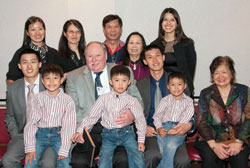A Journey Through Time

Ha-Thanh Nguyen (back row, far right), JD '11, and her family were reunited with retired U.S. Navy Capt. Al Bell, who rescued them, at a May banquet in Virginia Beach.
Marc Shuman
For many students, law school is a time to focus on their futures. For Ha-Thanh Nguyen, JD '11, it was also a chance to uncover her past.
The story began in 2008, when Ms. Nguyen's legal research and writing professor, Tim McIlmail, asked about her family's journey from Vietnam to the U.S. Decades earlier, Professor McIlmail had volunteered in a Philippine refugee camp where thousands of Vietnamese refugees lived, awaiting sponsorship to other countries.
His question led to an unraveling of the past and a reunion for Ms. Nguyen's family with the U.S. Navy captain who had saved them and many others from near-certain death.
"Growing up in Chicago, I knew my family made it to the U.S. as 'boat people,' but up until Professor McIlmail asked me about it, I realized I knew very few details about the story of the escape and those who helped us get here," Ms. Nguyen says.
From conversations with her mother and documents her mother had saved, she learned that her family had faced persecution from Communists because her grandfather had worked for the former non-Communist government of South Vietnam. Additionally, her uncle had been in solitary confinement for 10 years for being a Catholic priest. Ms. Nguyen's family decided they had to get out of Vietnam and tried to escape several times before succeeding in June 1982.
Her sister, brother, dad, and mother—pregnant with her at the time—tiptoed barefoot through a swampy jungle. Upon reaching their boat, they were shocked to see a 35-foot wood fishing craft, instead of the larger ship they had paid to board. The boat would normally travel with only five to eight people, but 50 people were already crowded onto the vessel. Out of fear of detection by Communist guards, the family boarded the boat.
The boat sailed for two days in an attempt to get to Hong Kong, the Philippines, or anywhere but Vietnam. Several large ships passed by, but all of them refused to pick up the refugees. Just 150 miles off the coast, the boat's engine died. A storm was approaching and the overloaded boat began to take on water. Fearing they would drown, Ms. Nguyen's aunt burned her shirt to attract the attention of a passing ship.
The ship that they attracted was the U.S.S. Morton DD 948, a 415-foot U.S. Navy destroyer ship led by Captain Corwin "Al" Bell. Captain Bell had been given orders from his superiors not to pick up refugees out of concern that it would encourage more people to risk their lives at sea. Additionally, whichever country's vessel picked them up would be required to take them in. Seeing the condition of the boat, though, Captain Bell decided he could not let them die.
The Nguyen family moved to the U.S. and settled in Chicago in December 1982, and two months later, Thanh was born. Ms. Nguyen's family back in Vietnam gave her the nickname "Nam-My," which means "Vietnam-America," because she was the first American-born child of the group of 52 refugees aboard the boat.
Shocked about the details of her family's past, she dug deeper and searched for information about the U.S.S. Morton. She discovered that Captain Bell had posted information about the ship and crew online, as well as some correspondence with other members of the 52 people rescued that day. She sent him this message:
"Dear Captain Bell, My name is Thanh, and I am the daughter of one of the families you saved in June of 1982. I cannot believe it has taken me this long to say this to you, but thank you…the entire trajectory of my life has been changed because of what you did for my family that one day."
She received a response from Captain Bell and the two kept in touch. Just before her graduation from GW Law in May 2011, Ms. Nguyen and her family were invited to a reunion for the ship's crew members. Ms. Nguyen served as the guest speaker.
Shortly after graduating from GW she spent time in Vietnam working for a United Nations office to help combat human trafficking.
"The experience of my family being saved by an American captain has inspired me to continuously return to Vietnam to help the people my family was forced to leave."
—Kate Harlander-Locke
